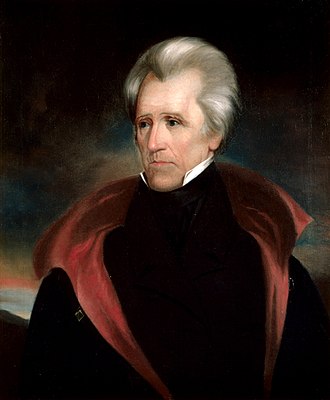
- Details
- By Native News Online Staff
This Day in History. On this day in 1830, 193 years ago, President Andrew Jackson signed the Indian Removal Act.
The Act established a process whereby the president could grant land west of the Mississippi River to Indian tribes that agreed to give up their homelands. As incentives, the law allowed the Indians financial and material assistance to travel to their new locations and start new lives and guaranteed that the Indians would live on their new property under the protection of the United States Government forever.
With the Act in place, Jackson and his followers were free to persuade, bribe, and threaten tribes into signing removal treaties and leaving the Southeast portion of the country.
By the end of his presidency, he had signed into law almost seventy removal treaties, the result of which was to move nearly 50,000 eastern Indians to Indian Territory—defined as the region belonging to the United States west of the Mississippi River but excluding the states of Missouri and Iowa as well as the Territory of Arkansas—and open millions of acres of rich land east of the Mississippi to white settlers. Despite the vastness of the Indian Territory, the government intended that the Indians’ destination would be a more confined area—what later became eastern Oklahoma.
The Indian Removal Act set in motion the Trail of Tears, which attributed to the genocide of thousands of American Indians and the death of one-quarter Cherokee people. For this reason, Jackson is referred to by Native Americans as the “Indian-killer” president and do not feel he should be honored or celebrated in any fashion, including being on the twenty-dollar bill.
More Stories Like This
Native News Weekly (August 25, 2024): D.C. BriefsUS Presidents in Their Own Words Concerning American Indians
Indigenous Actor Elaine Miles Reports Detention by Alleged ICE Agents
Happy Thanksgiving from Native News Online
Coming Up on Native Bidaské: Behind the Animation: Joey Clift Talks “Pow” and Native Storytelling
Help us tell the stories that could save Native languages and food traditions
At a critical moment for Indian Country, Native News Online is embarking on our most ambitious reporting project yet: "Cultivating Culture," a three-year investigation into two forces shaping Native community survival—food sovereignty and language revitalization.
The devastating impact of COVID-19 accelerated the loss of Native elders and with them, irreplaceable cultural knowledge. Yet across tribal communities, innovative leaders are fighting back, reclaiming traditional food systems and breathing new life into Native languages. These aren't just cultural preservation efforts—they're powerful pathways to community health, healing, and resilience.
Our dedicated reporting team will spend three years documenting these stories through on-the-ground reporting in 18 tribal communities, producing over 200 in-depth stories, 18 podcast episodes, and multimedia content that amplifies Indigenous voices. We'll show policymakers, funders, and allies how cultural restoration directly impacts physical and mental wellness while celebrating successful models of sovereignty and self-determination.
This isn't corporate media parachuting into Indian Country for a quick story. This is sustained, relationship-based journalism by Native reporters who understand these communities. It's "Warrior Journalism"—fearless reporting that serves the 5.5 million readers who depend on us for news that mainstream media often ignores.
We need your help right now. While we've secured partial funding, we're still $450,000 short of our three-year budget. Our immediate goal is $25,000 this month to keep this critical work moving forward—funding reporter salaries, travel to remote communities, photography, and the deep reporting these stories deserve.
Every dollar directly supports Indigenous journalists telling Indigenous stories. Whether it's $5 or $50, your contribution ensures these vital narratives of resilience, innovation, and hope don't disappear into silence.
 The stakes couldn't be higher. Native languages are being lost at an alarming rate. Food insecurity plagues many tribal communities. But solutions are emerging, and these stories need to be told.
The stakes couldn't be higher. Native languages are being lost at an alarming rate. Food insecurity plagues many tribal communities. But solutions are emerging, and these stories need to be told.
Support independent Native journalism. Fund the stories that matter.
Levi Rickert (Potawatomi), Editor & Publisher

